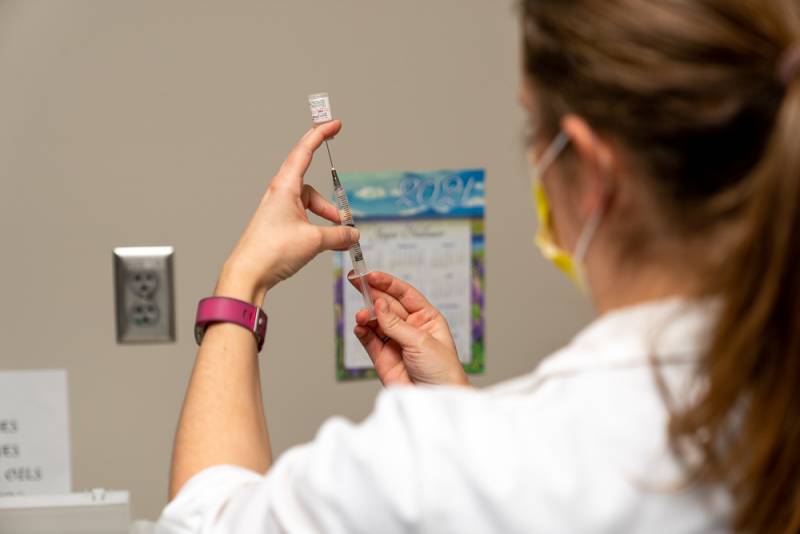This day will forever be marked as the day Watertown received the COVID vaccine.
Prairie Lakes Healthcare System has worked with the South Dakota Department of Health for several months in preparation of the vaccine and will begin dispersing the vaccine throughout the region during phase 1. Even though vaccinations began this week, it is essential that all people continue to engage in social distancing, wear a mask, and practice good hand hygiene as we continue our efforts to mitigate the spread of COVID.
Prairie Lakes Healthcare System is part of the Northern Plains Network, a network of independent health systems in South Dakota. The vaccine was dispersed to some members of the Network to increase the reach of the vaccine in South Dakota. These members include Brookings Health System, Huron Regional Medical Center, and Madison Regional Health System. Prairie Lakes is also working with long term care and assisted living facilities in Codington Country to vaccinate their employees during this initial phase.
At Prairie Lakes, staff was asked to complete a survey if they would like to receive the first round of vaccination. This information helped us complete our plan and collect contact information. Eligible staff members were contacted directly to schedule a specific time to receive the vaccine. Prairie Lakes strongly encourage employees to get the vaccine and offered it first to employees at the most risk of being exposed to the virus.
During the next phases Prairie Lakes will vaccinate more staff members, other front-line healthcare workers, EMS, and other designated groups. At the same time, long-term care residents will be vaccinated through their facilities’ pharmacy partners.
Frequently Asked Questions:
Is it safe?
The vaccine followed thorough and additional safety protocols managed by the FDA.
COVID-19 Vaccine Safety: Two independent advisory committees [ACIP and the FDA’s Vaccines and Related Biological Products Advisory Committee (VRBPAC)] review vaccine safety data. ACIP also monitors post-market safety and effectiveness data for new vaccines. For COVID-19, ACIP has formed a separate Vaccine Safety Technical (VaST) Subgroup to provide timely evaluation of vaccine safety, both pre- and post-licensure.
Enhanced Safety Monitoring for COVID-19 Vaccines: In addition to the Vaccine Adverse Events Reporting System (VAERS) and other systems routinely used by CDC and FDA to monitor vaccine safety, CDC is adding further monitoring programs for COVID-19 vaccines. Data on vaccinated healthcare workers will be collected through the National Healthcare Safety Network (NHSN) system. The Vaccine Safety Assessment for Essential Workers (V-SAFE) program, a smartphone-based active surveillance system, will collect text- or web-based health checks from early vaccine recipients who volunteer to report for 6 weeks post-vaccination. Any clinically important event(s) reported by the vaccine recipient will be followed up and a VAERS report will be submitted, as appropriate.
Are the guidelines now relaxed?
It is vital to keep following guidelines. The best way to prevent COVID-19 spread is still by wearing a mask, practicing social distancing, and washing your hands frequently.
Why can’t I have the vaccine right now when others are receiving it?
Unfortunately, at this time, there is not enough vaccine for everyone who is requesting it. We are following best practice guidelines to distribute the vaccine to those who are most at risk, including those living in long-term care facilities. It is our hope to have enough vaccine for everyone requesting it during the spring of next year. The best way to prevent COVID-19 is by wearing a mask, practicing social distancing and washing your hands frequently.
If I’ve had COVID-19, do I need a vaccination?
Yes, we are recommending all employees and community members to get the COVID-19 vaccine, regardless of whether they have recovered from a previous COVID-19 infection, once it is available to their group.
According to the CDC, there is not enough information currently available to say if or for how long after infection someone is protected from getting COVID-19 again; this is called natural immunity. Early evidence suggests natural immunity from COVID-19 may not last very long, but more studies are needed to better understand this.
Does the flu shot increase my chance of getting COVID?
The flu shot does not increase your chance of getting COVID-19. It actually decreases your chance of getting sick. A flu vaccine will not protect you from getting COVID-19, but it can prevent you from getting the flu at the same time as COVID-19. This can keep you from having a more severe illness. While it’s not possible to say with certainty what will happen in the fall and winter, CDC believes it’s likely that flu viruses and the virus that causes COVID-19 will both be spreading during that time. That means that getting a flu vaccine will be more important than ever.
How were groups allocated?
The vaccine is sent in limited doses. Vaccination priority lists have been made based on job duties and risk of COVID exposure. This means identified front line workers had access to the vaccine first and then as more vaccine arrives we will continue to vaccinate staff and others according to our eligibility criteria.
Read more FAQs from the Department of Health Read about COVID vaccine benefits

